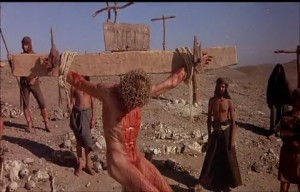Friends in Christ,
Converts from Islam go through a painstaking, and may be endless state of shame in their communities. I was meditating this morning on how Christ took our shame when I came across this wonderful sermon by Rev. Terry Cripe. If you have some more comforting thoughts, please share them:
“The Old Rugged Cross, describes the cross as “the emblem of suffering and shame.” I can’t tell you how many sermons I’ve heard about the suffering of Christ on our behalf. But I don’t know that I’ve heard any sermons on the shame that Christ endured for all people, and its implication for us.
You can blame part of that omission on most artists and some sculptors. Understandably, they don’t like to picture Christ naked. It is embarrassing. Shameful. Yet think how much more shameful it was for Him! He was not only stricken, smitten, and afflicted. He was stripped naked, too. Hands that instinctively try to cover nakedness are restrained by nails. The second Adam is stripped of the last vestiges of human dignity. And not just naked, but naked in front of people who know him. Forced to perform bodily functions in public that are normally done in private.
Why is it important to proclaim a Christ who suffered shame for us? Because we have devised a whole host of ways to alleviate the shame that is rightfully associated with our sinful state. Shame is uncomfortable. We don’t like to see other people suffer shameful situations, especially if they are close family or friends. So the shame of bearing a child outside of marriage has been alleviated. (Eons ago, a high school classmate of mine less than three months pregnant had to leave school during the final week of class. She was not allowed to march in the graduation exercise, and was deprived of her college scholarships.) We lessen the shame of gluttony by assuring people that their overweight condition is a matter of genetics and so beyond their control. (Oprah has announced that she is “comfortable” with her current body weight.) Alcoholism is only a sickness. Homosexuality is simply an alternative lifestyle. Divorce is a casualty experienced by over a third of married couples, so that can hardly be worthy of a raised eyebrow. Gossip is a minor character flaw. Uncontrollable tantrums are to be solved by anger management classes. Girls make pornographic films simply to finance their college tuition.
Now the point is that everyone who should feel shame at these things is grateful for how society has tried to remove shame associated with them by viewing these things simply a part of life. Well, they are half right. These acts or conditions are a part of life – the life we’ve been stuck with since our first parents tried to alleviate their shame at seeing themselves naked. But society offers the wrong answer to shame by making light of it or by trying to lessen it. Our ways are no more successful than Adam and Eve’s attempt to resolve shame by sewing fig leaves for themselves. We have a God who identified with our shame by enduring it for us. To make light of our shame makes light of his. Not to take our shame seriously forces us to discount his as well.
So, brother pastors, can you proclaim the better way that shame has been dealt with? Can you proclaim in Christ a release from shame that is truly liberating? Not to do so would, in my opinion, be a shame.” AMEN
